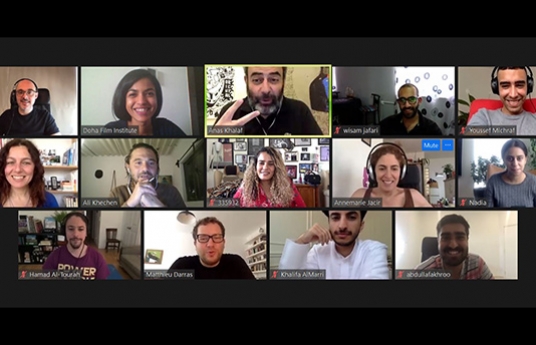Doha Film Institute Hosts ‘Hezayah Screenwriting Lab’ for Feature Screenplay Development
Jul 08, 2020

- Acclaimed Palestinian filmmaker Annemarie Jacir and Lebanese script consultant Joelle Touma to mentor selected projects
- Two Qatari writer-directors are part of this year’s workshop
Doha, Qatar; 08 June 2020: The Doha Film Institute (DFI) is hosting the latest edition of its popular ‘Hezayah Screenwriting Lab’ for emerging screenwriters and writer-directors to assist in the development and writing of original feature-length screenplays.
Delivered in three sessions of five-day workshops, taking place over a period of six months from June 2020 to January 2021, the lab is designed to assist emerging screenwriters and writer-directors to develop and write an original feature-length screenplay, built around in-depth group sessions and individual feedback. Participants will work in small groups with the support of experienced mentors and are encouraged to develop personal stories that reflect contemporary life in the Middle East region. Participants are selected on the basis of the strength of their screenplay idea, their writing ability, their vision and approach, and their previous work.
Fatma Hassan Alremaihi, Chief Executive Officer of DFI, said: “Screenwriting is both a foundation of film and an art form in itself. As an underpinning aspect of film development, DFI’s long-running specialised Hezayah Screenwriting Lab is a transformative experience where aspiring talents examine and explore their inner creativity and personal voice.”
“It offers a comprehensive take on the screenwriting process, from initial character and theme development to the final pitching session, covering both the creative and practical perspectives. The lab helps participants realise the potential of their narratives and expand story ideas into compelling works of cinema, while making them attune to realistic budgeting on different film production scales,” she added.
This year’s lab mentors include: acclaimed Palestinian filmmaker, Annemarie Jacir, whose work has premiered as Official Selections in Cannes, Berlin, Venice, Locarno, and Telluride; three of her feature films were Palestine’s official Oscar entries, and Script Consultant, Joelle Touma, a renowned screenwriter and script doctor with extensive credits in film and television. Lab Advisor, Matthieu Darras, leads and designs several programmes of talent development and film consultancy that are active worldwide, including the First Cut Lab, the Pop Up Film Residency, and the Full Circle Lab.
The first session will take place online from June 12-16, followed by the second session from September 24-28 and the final session held in January 2021. The projects participating in the Lab will be eligible to apply for the Pop Up Film Residency Award, which consists of a three-week film residency programme in one of the residences of the Pop Up Film Network next year.
The selected screenplay projects for the 2020 Hezayah Screenwriting Lab include Anas Khalaf’s The Photographer, the story of a Syrian man at the heart of the regime who decides to leave Syria and defect,; Ben Robinson’s Sabah in which a Qatari teenager directs her drama group to broadcast their controversial performance live across social media; Hamad Al Tourah’s Passports, about a Texan woman living in Kuwait who runs into troubles in her marriage that begin to loosen her grip on life in the country; Cotton Queen by Suzannah Mirghani, the story of 15-year-old Nafisa who finds herself in an arranged marriage in a cotton-farming village in Sudan and must learn to stand up for herself; Wisam Al Jafari‘s The Hearse to the Final House of Happiness, follows Lina, the daughter of a hearse driver, who attempts to reach her sister prior to her wedding night; and Youssef Michraf’s Sweet Disposition, about a young boy who searches the streets for a fifty year-old man to impersonate his father at his high school. Two projects helmed by Qatari screenwriters are also part of the workshop, Khalifa Al Marri and Abdulla Fakhroo’s Will I Ever Be Good Enough, about a father’s fervent search for his missing daughter that leads him to find a few surprises along the way; and Nadia Al Khater’s Democracy, about a class clown and teacher’s pet battle to win the presidency in a contentious student election.
To learn more about the Institute’s year-round initiatives and programmes, visit: www.dohafilminstitute.com